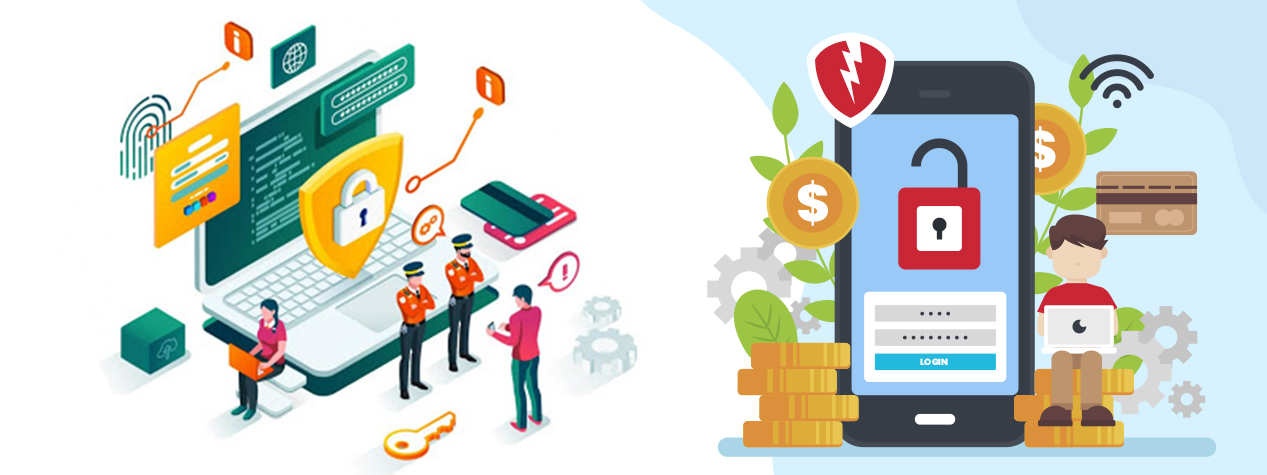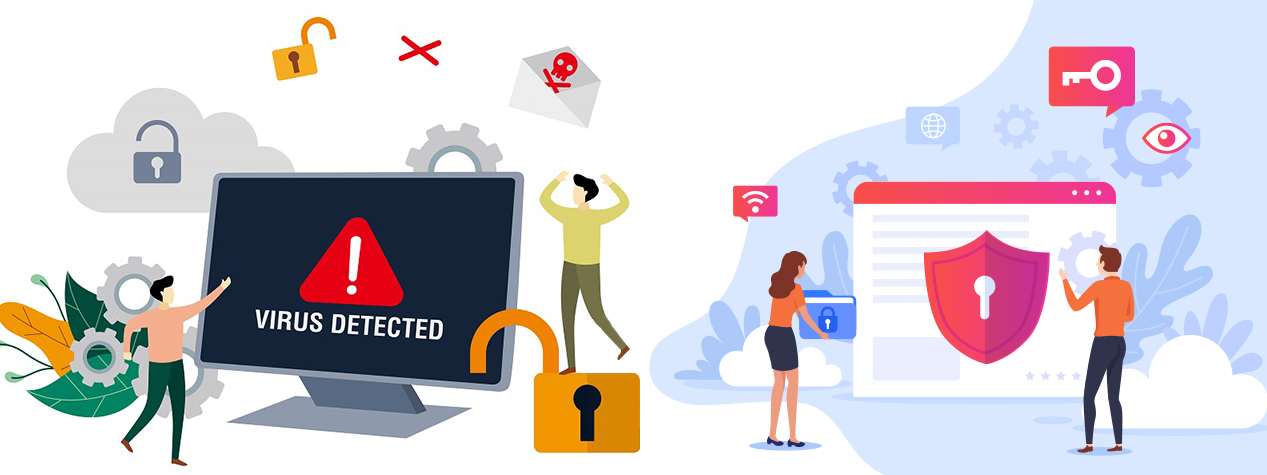
May 18, 2020 Category:
Technology

So that makes it extremely crucial for the small businesses to consider protection against these threats, but unfortunately, some of them are not even aware about how exposed are they, to such threats, leave aside the measures to be adopted for security. They tend to overlook this important factor, while grinding themselves to keep running within ‘reasonable’ or cheaper resources.
To fight these threats, it is important to know them first. In various attempts to attack small business, cybercriminals have been creating novel ways of cyberattacks. The most common cyberthreats are – Phishing, Watering holes, and Drive-by downloads. Among these, Phishing has been the most common form cyberattack, that happens through emails containing malicious attachments or links, clicking on which may lead to harmful downloads like Malware. It is reported that, 92.4% of malware is delivered through emails.
Not only this, according to Symantec’s 2019 Internet Security Threat Report, 1 in every 323 emails received by small organizations is malicious.
The term Watering Holes refers to the websites that are taken over by the cyber criminals, and converted into the malicious websites, without even getting a hint to the owner of these websites. The Drive-by download threat is about the malicious website that tries to install software on your device without even seeking any permission.
Various cyber security news updates keep getting reported every now and then. The data theft news is quite common these days, apart from other nasty unethical activities like stealing your customer’s personal information and attempting fraud over them. So, its high-time, you consider protecting your small business from such disastrous activities attempts.
It is important to keep updating your software regularly. It not only enhances business processes, but also reduces vulnerabilities to a great extent. The probability of cyberthreats is always higher in outdated software systems. To make regular updates, train your employees in installing updates, as this should be a regular practice in your organization.
Passwords serve as the key-code that you enter in your locker system. However, you need to come up with passwords that are too strong to get cracked. To make most of the password security, set up the passwords on everything that contains the sensitive information. This way, you will be limiting the access for nasty minds.
You should keep updating these passwords regularly. Of course, you need to be sure, you remember every password you setup, or else you may end up boggling your mind over recalling it!

A virtual private network (VPN) creates an encrypted connection where there is insecure network. VPNs mask all the important information and activities of the company by using protocols to encrypt data. It encrypts all the traffic passing through the devices.
So, even if anybody manages to steal the information anyhow, all they will receive is the encrypted information, which will be of no use to them.
A small business may not have enough means and capital to provide their employees the office-owned devices. And so, the employees may be using their personal devices like laptops, tablets, and phones to access company information and data, leading them to an insecure state.
Well, you better keep monitoring these devices. How to go about it?
It’s very simple! You just need to have your network administrator install a monitoring software for you. The software contains certain automated features like – security updates, and call for regular resetting of the password. You may seem to be disturbing your employees’ privacy, but are simply on a mission to protect your company’s information on their devices, that’s it!
No matter how stringent you may apply measures on your data infrastructure system, unless you spread awareness among your employees or train them about how to use the company’s resources, you cannot expect your data to be safe enough.
Sometimes, employees tend to cause data security breach unknowingly. So, they should be told to follow security protocols which holds utmost importance failing which, they will be subjected to pay penalties. Who would want to pay from their pocket? Definitely, they will take a note of that!

To get security audits done on your data systems, you will definitely require an experienced IT consultant or firm. They will audit the system to detect the vulnerabilities or weaknesses.
As they keep detecting the weaknesses, they should be making changes right there, which will ultimately improve the security of your business information and data.
Whatever be the scenario, whether your data is protected or is still insecure, you need to create a backup of it.
Do not rely just upon one source, keep your data on secure multiple sources to backup your data. An external drive can be considered as a safe option for data backup.
Installing Firewalls can be great, as the network security system monitors the entire traffic running through the network. A firewall stands as a security wall between internal network and external network.

The digital atmosphere contains many viruses floating with malicious intentions. All the devices that are digitally connected, are exposed to these viruses leading all the data in them at risk. So, to ensure that all the data is safe, you should get an antivirus protection by installing the latest software.
Apart from this, the software should regularly be updated. Don’t fall for free antivirus software as they may not be as reliable and may rather contain malicious elements. Be open on investing in security means, as that’s what is going to protect your precious data.
To make sure that all the crucial data you have, is safe and secure in your device, refrain from using that device for your personal communication, entertainment, or chat with your family and friends. All that you download and share from your personal device may put your business data at the risk of loss by getting deleted or even get shared by mistake, to the wrong destination. Your data will be exposed to lot many risks.
Your hardware is equally important, protect it. It is better to prevent unauthorized access to the systems that store your data, especially the laptops and mobile phones that can easily be stolen from anywhere. So, ensure their safety by restricting the entry of anyone in the setup.
Also, make sure to have every employee use strong passwords that are known only to the trusted IT staff.
Cyber security is not a word of mouth information; it is rather a set of safety protocols that should be implemented without any gaps and loose ends. These protocols should be well-documented, based on which, the orientation and training sessions should be conducted time to time in organizations, big and small. The documentation process can be started and executed, following the planning guide FCC’s Cyberplanner 2.0.
To guide small businesses through the security measures to be taken, a Cyber security portal by Small Business Administration (SBA) provides information on how to conduct online training sessions and maintain checklists.
Cyber security is becoming a grave matter of concern owing to the advanced methods being tried by cybercriminals to threaten data security. So that makes it imperative for businesses to protect their data, keeping cyber security at top priority. Survival of the secure is the watchword today.
Know about the Developments in Healthcare Industry with Artificial Intelligence.